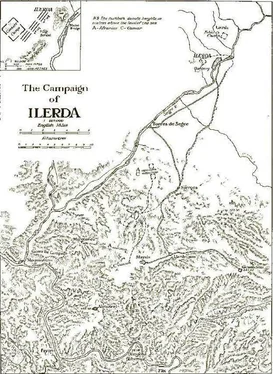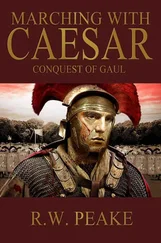R. Peake - Marching With Caesar – Civil War
Здесь есть возможность читать онлайн «R. Peake - Marching With Caesar – Civil War» весь текст электронной книги совершенно бесплатно (целиком полную версию без сокращений). В некоторых случаях можно слушать аудио, скачать через торрент в формате fb2 и присутствует краткое содержание. Жанр: Исторические приключения, на английском языке. Описание произведения, (предисловие) а так же отзывы посетителей доступны на портале библиотеки ЛибКат.
- Название:Marching With Caesar – Civil War
- Автор:
- Жанр:
- Год:неизвестен
- ISBN:нет данных
- Рейтинг книги:5 / 5. Голосов: 1
-
Избранное:Добавить в избранное
- Отзывы:
-
Ваша оценка:
- 100
- 1
- 2
- 3
- 4
- 5
Marching With Caesar – Civil War: краткое содержание, описание и аннотация
Предлагаем к чтению аннотацию, описание, краткое содержание или предисловие (зависит от того, что написал сам автор книги «Marching With Caesar – Civil War»). Если вы не нашли необходимую информацию о книге — напишите в комментариях, мы постараемся отыскать её.
Marching With Caesar – Civil War — читать онлайн бесплатно полную книгу (весь текст) целиком
Ниже представлен текст книги, разбитый по страницам. Система сохранения места последней прочитанной страницы, позволяет с удобством читать онлайн бесплатно книгу «Marching With Caesar – Civil War», без необходимости каждый раз заново искать на чём Вы остановились. Поставьте закладку, и сможете в любой момент перейти на страницу, на которой закончили чтение.
Интервал:
Закладка:
Before the end of the watch, the Pompeians left their camp to form up in an aciestriplex facing ours, and there they stood waiting for us. It was another third of a watch before all of our men had returned from their work, whereupon we in turn left our camp to face the enemy. Despite also forming up in an acies triplex , Caesar modified it from our usual practice by placing the archers that had arrived with the Gallic column, along with a contingent of slingers with us from the beginning, in the center of the formation. He then deployed our cavalry in two wings, one on either side of the formation. The 10 thtook what we considered our rightful place on the right wing, making ready for whatever was to come. Because of the relatively narrow space between the two camps, by the time both armies arrayed themselves, there was little more than 200 paces between the two armies, putting us close enough to recognize some of the men facing us. I believe to this day that it was that recognition of friends and kin that stopped the battle, since the sun crept through the sky and no orders were issued by either side. There was a constant buzz of excited muttering, as men recognized each other.
“By the gods, Glabius, isn’t that that bastard Serenus over there? I haven’t seen him since the three of us. .”
“Pluto’s thorny cock, I didn’t know Fuscus was still under the standard! I thought he was dead!”
“Quiet down, you bastards,” I roared. “You act like you’ve never been on a battlefield before.”
“Not on one where I’m staring at my cousin,” came a voice from the ranks.
I whirled around, knowing that I should find the man who said that, but truly, my heart was not in it because I knew how he felt. Meeting up with Cyclops had brought home to me what it meant to these men to be standing here, facing friends and relatives. Oh, we had gone through multiple skirmishes, but our cavalry had done the bulk of the fighting; they were Germans and had no connection with the men standing across from us. Even after the incident in the Pompeian camp, we still largely held no animosity towards the rank and file of the Pompeian army, knowing that the slaughter of our men was the doing of Petreius and, to a lesser extent, Afranius, who had not stopped Petreius. Consequently, we stood there, waiting for a command that I do not believe any of us wanted to follow, but one that I knew we would if it indeed came.
Fortunately, Caesar was no more eager for this battle than we were. Obviously, neither were Afranius and Petreius, because the sun dipped to the edge of the horizon before the horns sounded the recall, first on the Pompeian side, then on ours, and we all filed back inside our respective camps, wondering if we would be doing the same thing the next day.
~ ~ ~ ~
The next morning found us resuming the work on the contravallation, while Petreius and Afranius took one last desperate roll of the dice by sending groups of their cavalry out to find possible fords across the Sicoris, now only a couple of miles distant. Caesar countered the move by sending detachments of our own cavalry, beating the Pompeians to the river and setting up a chain of outposts at every likely crossing point, thereby defeating the Pompeian attempt before it even started. The end had come for the Pompeians. They had been out of forage for their remaining stock for four days, had run out of food for the men the day before, and were now out of water. Shortly before midday, a party of Pompeians approached the camp under a flag of truce, asking for an audience with Caesar, which he granted. The representative asked Caesar that he grant the request of Afranius that the discussion take place out of our sight, which Caesar denied, indicating that the negotiations should take place in the open between the two camps. Afranius had no choice but to agree and sent his son over to us as a hostage, waiting for Caesar roughly halfway between our two camps. Our ramparts were packed with men watching the exchange between our two generals and I am not ashamed to say that I had one of the best seats in the theater, by virtue of my size and reputation as much as by my rank. We could not hear what was said, meaning we had to try to translate the body language and gestures of the two men in order to try to make some sense of what was taking place. As usual, there was always some wit who provided his own version of the dialogue; while I do not remember who it was on this occasion, it brought to mind the painful recollection that in the past it had been Calienus who kept us almost doubled over in laughter as he played the part of some Gallic chieftain begging Caesar for mercy.
“Oooooh, great Caesar, I am here to beg you not to kill us, and I’ll do anything you ask.” This was spoken in a high falsetto voice by someone a short distance down the rampart, causing some snickers.
“Really? What do you mean by ‘anything’?”
Although the part of Caesar was spoken in a deeper voice, it obviously came from the same man.
“Why, I’ll get on my knees and suck your cock, right here in front of everyone,” the falsetto replied, and the snickers quickly became guffaws of laughter.
“Well, that’s certainly a tempting offer. I haven’t had my cock sucked in, oh, well since this morning. .”
I could not hear what he said after that, since it was drowned out by laughter. I knew that either myself or one of the other Centurions should be shutting the unknown comedian up, but I glanced over at Primus Pilus Torquatus and he was grinning from ear to ear, clearly enjoying himself as much as the rest of the men. And so was I, so I laughed along with everyone else.
“But I’m afraid that my men would need to have their cocks sucked as well. It’s been much longer for most of them.”
“Welllll,” the falsetto tried to convey a sense of doubt, “it would take me a while, but I suppose…”
At this point, our laughter must have reached the ears of Caesar, because he turned around to glare back at us, and there is no way to describe how quickly the mirth died away. Each of us felt sure that he was looking directly at us, even we Centurions felt a flip-flopping in our stomachs. Caesar was a fair and even-tempered commander, but we had all seen him lose it and none of us wanted to bear the brunt of his anger. Turning to snap an order to be quiet, I instantly saw that there was no need; you could have heard a gnat fart in the silence.
The conference continued, and we clearly saw Caesar shake his head, the gesture met by a look of dismay on the face of Afranius. However, Caesar continued speaking and we could see Afranius’ expression change, his face assuming a look of unmistakable relief. Whatever was said could obviously be heard by the Pompeian Legions standing on their own rampart, because a huge roar of joy came rolling across the ground, assaulting our ears in waves of exultation.
The Primus Pilus turned to me, and with a grin said, “Well, I guess we won.”
~ ~ ~ ~
Won we had, and then some. With a minimum of bloodshed, Caesar had achieved the disbandment of Pompey’s entire army, in a manner that left the Pompeians neither embittered nor destitute. Caesar promised that he would restore to the men of the Pompeian army the property they had lost when their camp was overrun, although that was not one of his more popular decisions, I can tell you. Further, Caesar ordered that the three Spanish Legions of Pompey’s army, the 4th, 5th, and 6th, whose discharges were due, were to be disbanded, paid their final amounts and be allowed to go home. Not surprisingly, at least to some of us, this also did not sit well with some of our own men, particularly with the 7th, 8th, and the 9th because their time was up as well, enlisting at the same time as the Pompeian Legions. The sentiment was that, since their discharges were up as well and they were on the winning side, the right thing for Caesar to do was to grant them their own discharges. The 10th, on the other hand, still had some time left on our enlistments, meaning it was not an issue for us, but the 9th, in particular, was the most vocal in their grumbling. Caesar chose to send back the Valeria and 3rd Legion to their home territory in Cisalpine Gaul, He decided to send the 7th and 9th with them as an escort, promising the Pompeians that they would be discharged and paid off once they were back in their home territory. The 7th and 9th were ordered to continue marching back to Italia, to report to Marcus Antonius and await Caesar’s orders. Despite this being an unpopular command, at least with the two Legions involved, it was nothing compared to the reaction to his final order, the release and parole of Afranius and Petreius. This act was met with outrage by the army, and I confess that I was just as angry as any man, having lost a number of good men at their hands, not by honorable battle but by treachery. Still, Caesar’s will was to be obeyed in all things, and accordingly we stood in formation and in stony silence watching the two generals and their staffs given their paroles and allowed to leave. It was only a small comfort to us to see the look of fear and apprehension on the faces of both Afranius and Petreius as they rode through our ranks out of the camp. Then it was over, at least this part of it, but only part of the province was ours. There was still the west to subdue, and Caesar now turned his attention to it.
Читать дальшеИнтервал:
Закладка:
Похожие книги на «Marching With Caesar – Civil War»
Представляем Вашему вниманию похожие книги на «Marching With Caesar – Civil War» списком для выбора. Мы отобрали схожую по названию и смыслу литературу в надежде предоставить читателям больше вариантов отыскать новые, интересные, ещё непрочитанные произведения.
Обсуждение, отзывы о книге «Marching With Caesar – Civil War» и просто собственные мнения читателей. Оставьте ваши комментарии, напишите, что Вы думаете о произведении, его смысле или главных героях. Укажите что конкретно понравилось, а что нет, и почему Вы так считаете.












